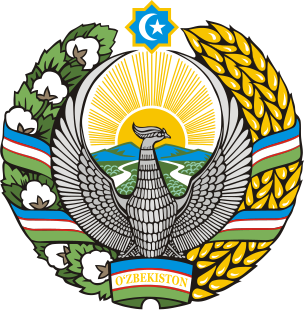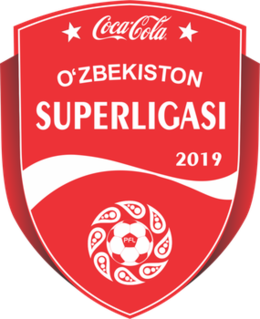
Uzbekistan, officially Republic of Uzbekistan, is a country in Central Asia. It is bordered by five landlocked countries: Kazakhstan to the north; Kyrgyzstan to the northeast; Tajikistan to the southeast; Afghanistan to the south; and Turkmenistan to the southwest. Along with Liechtenstein, it is one of the world's only two doubly landlocked countries.

Uzbekistan joined the Commonwealth of Independent States in December 1991. However, it is opposed to reintegration and withdrew from the CIS collective security arrangement in 1999. Since that time, Uzbekistan has participated in the CIS peacekeeping force in Tajikistan and in United Nations-organized groups to help resolve the Tajik and Afghan conflicts, both of which it sees as posing threats to its own stability. Uzbekistan is an active supporter of U.S. efforts against worldwide terrorism and joined the coalitions which have dealt with both Afghanistan and Iraq. It is a member of the United Nations, the Euro-Atlantic Partnership Council, Partnership for Peace, and the Organization for Security and Cooperation in Europe (OSCE). It belongs to the Organisation of Islamic Cooperation (OIC) and the Economic Cooperation Organization, which comprises 7 Central Asian countries: Pakistan, Uzbekistan, Kazakhstan, Turkmenistan, Afghanistan, Kyrgyzstan and Tajikistan. It is a founding member of and remains involved in the Central Asian Union, formed with Kazakhstan and Kyrgyzstan, joined in March 1998 by Tajikistan.

Samarkand, alternatively Samarqand, is a city in south-eastern Uzbekistan and one of the oldest continuously inhabited cities in Central Asia. There is evidence of human activity in the area of the city from the late Paleolithic era, though there is no direct evidence of when Samarkand was founded; some theories propose that it was founded between the 8th and 7th centuries B.C. Prospering from its location on the Silk Road between China and the Mediterranean, at times Samarkand was one of the greatest cities of Central Asia.

Uzbek is a Turkic language that is the first official and only declared national language of Uzbekistan. The language of Uzbeks, it is spoken by some 27 million native speakers in Uzbekistan and elsewhere in Central Asia (2015), making it the second-most widely spoken Turkic language after Turkish.

Bukhara is a city in Uzbekistan. Bukhara is rich in historical sites, with about 140 architectural monuments. The nation's fifth-largest city, it had a population of 247,644 as of 31 August 2016. But according to the Statistics of O’zStatQo’m Department the City is the second largest after Tashkent by number of people who migrate. Number of daily migrants is 4,752,000 as of 22nd April 2018. People have inhabited the region around Bukhara for at least five millennia, and the city has existed for half that time. The mother tongue of the majority of people of Bukhara is Tajik. Located on the Silk Road, the city has long served as a center of trade, scholarship, culture, and religion. UNESCO has listed the historic center of Bukhara as a World Heritage Site.
ISO 3166-2:UZ is the entry for Uzbekistan in ISO 3166-2, part of the ISO 3166 standard published by the International Organization for Standardization (ISO), which defines codes for the names of the principal subdivisions of all countries coded in ISO 3166-1.

Tajik or Tajiki, also called Tajiki Persian and Tadzhiki, is the variety of Persian spoken in Tajikistan and Uzbekistan by Tajiks. It is closely related to neighboring Dari Persian with which it forms a continuum of mutually intelligible varieties. Since the beginning of the twentieth century and independence of Tajikistan from Soviet Union, Tajik has been considered by a number of writers and researchers to be a variety of Persian. The popularity of this conception of Tajik as a variety of Persian was such that, during the period in which Tajik intellectuals were trying to establish Tajik as a language separate from Persian language, Sadriddin Ayni, who was a prominent intellectual and educator, made a statement that Tajik was not a "bastardized dialect" of Persian. The issue of whether Tajik and Persian are to be considered two dialects of a single language or two discrete languages has political sides to it.

The Islamic Movement of Uzbekistan was a militant Islamist group formed in 1998 by the Islamic ideologue Tahir Yuldashev, and former Soviet paratrooper Juma Namangani—both ethnic Uzbeks from the Fergana Valley. Its original objective was to overthrow President Islam Karimov of Uzbekistan, and to create an Islamic state under Sharia; however, in subsequent years, it reinvented itself as an ally of Al-Qaeda. The group also maintained relations with Afghan Taliban in 1990s. However, later on, relations between both the Afghan Talibans and Islamic Movement of Uzbekistan started declining. In mid-2015 its leadership publicly pledged allegiance to the Islamic State of Iraq and the Levant (ISIL) and announced that the IMU was part of the group's regional branch. In 2016, it was reported that a new faction of Islamic Movement of Uzbekistan emerged after the group became part of Islamic State (IS). The new faction retained the group's name and was independent of Islamic State (IS). It has also indicated that it is loyal to al-Qaeda and the Taliban and shared their views against the Islamic State (IS).
OJSC National Air Company Uzbekistan Airways, operating as Uzbekistan Airways, is the flag carrier airline of Uzbekistan, headquartered in Tashkent. From its hub at Tashkent International Airport, the airline serves a number of domestic destinations; the company also flies international services to Asia, Europe and North America

The Supreme Assembly is the parliament of Uzbekistan. It succeeded the Supreme Soviet in 1995, and was unicameral until a reform implemented in January 2005 created a second chamber.

Football Club Nasaf – is a professional football club based in Qarshi, Uzbekistan. Participant of the Uzbekistan Pro League.

Uzbekistan Super League, also called Coca-Cola Uzbekistan Super League due to sponsorship by Coca-Cola, is the top division of football in Uzbekistan, and is operated under the auspices of the Uzbekistan Professional Football League and Uzbekistan Football Association. It was founded in 1992 and is participate by 14 teams. The top three teams get a chance to compete in the AFC Champions League, while the one last ranked teams are relegated to the Uzbekistan Pro League.

Uzbekistan first participated at the Olympic Games as an independent nation in 1994, and has sent athletes to compete in every Games since then.

Uzbekistan competed at the 2016 Summer Olympics in Rio de Janeiro, Brazil, from 5 to 21 August 2016. This was the nation's sixth consecutive appearance at the Summer Olympics in the post-Soviet era.
This is a list of football games played by the Uzbekistan national football team between 2010 and 2019.